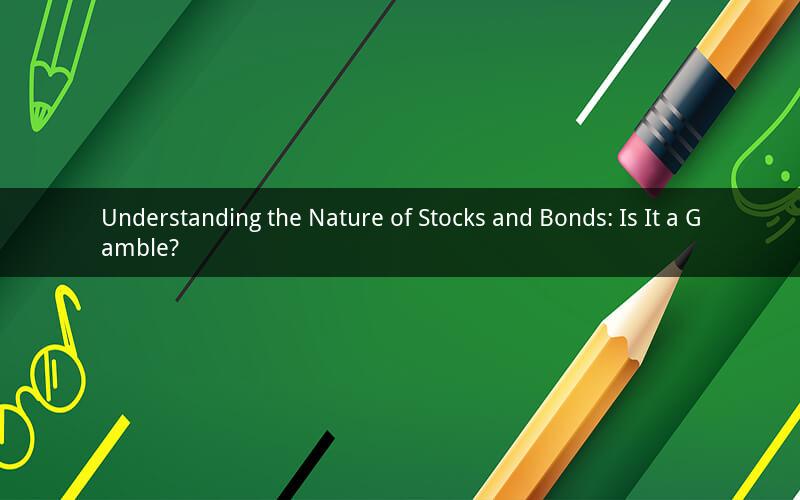
Stocks and bonds are two of the most popular investment instruments in the financial market. However, there is often a debate about whether investing in these instruments is a gamble or not. In this article, we will delve into the characteristics of stocks and bonds and analyze whether they can be considered as a gamble.
1. Stocks: A Risky Investment?
Stocks represent ownership in a company. When you purchase stocks, you are essentially buying a piece of the company. The value of a stock can fluctuate significantly based on the company's performance, market conditions, and other factors. Here are some points to consider:
- Potential for High Returns: Historically, stocks have provided higher returns compared to other investment vehicles. However, these returns come with higher risk.
- Volatility: Stock prices can be highly volatile, leading to significant gains or losses in a short period of time.
- Market Risk: Stock prices are influenced by various factors, including economic conditions, political events, and company-specific news.
- Liquidity: Stocks are generally highly liquid, meaning you can buy or sell them easily.
2. Bonds: A Safer Investment?
Bonds are debt instruments issued by companies or governments to raise capital. When you purchase a bond, you are lending money to the issuer in exchange for periodic interest payments and the return of the principal amount at maturity. Here are some points to consider:
- Fixed Income: Bonds provide fixed interest payments, making them a more predictable investment compared to stocks.
- Lower Risk: Bonds are generally considered less risky than stocks, as they offer a higher level of security due to the debt nature of the investment.
- Liquidity: Bonds are also highly liquid, allowing investors to buy or sell them easily.
- Credit Risk: The risk of default is a concern for bond investors, especially for corporate bonds.
3. Is Investing in Stocks and Bonds a Gamble?
The question of whether investing in stocks and bonds is a gamble depends on several factors:
- Investment Strategy: A well-diversified investment portfolio can mitigate risks associated with stocks and bonds. By spreading investments across various asset classes, investors can reduce the impact of market fluctuations.
- Market Conditions: The overall market conditions play a significant role in the performance of stocks and bonds. During economic downturns, stocks may decline, while bonds may provide some stability.
- Investor's Risk Tolerance: Investors with a higher risk tolerance may be more comfortable investing in stocks, while those with lower risk tolerance may prefer bonds.
- Time Horizon: The time horizon for an investment also affects the level of risk. Short-term investments may be riskier, while long-term investments can offer more stability.
4. Key Questions and Answers
Q1: Are stocks and bonds always considered risky investments?
A1: No, stocks and bonds can be considered risky depending on the specific instrument and market conditions. While stocks are generally considered riskier, bonds can also be risky, especially corporate bonds with higher credit risk.
Q2: Can investing in stocks and bonds be considered a gamble?
A2: Yes, investing in stocks and bonds can be considered a gamble if an investor is not well-informed or lacks a proper investment strategy. However, with proper research and diversification, the risk can be minimized.
Q3: Are bonds always safer than stocks?
A3: No, bonds are not always safer than stocks. While bonds generally offer lower risk, the level of risk can vary depending on the issuer and market conditions. Corporate bonds may be riskier than government bonds.
Q4: Should I invest in stocks or bonds?
A4: The decision to invest in stocks or bonds depends on your investment goals, risk tolerance, and time horizon. It is essential to consult with a financial advisor to determine the best investment strategy for your needs.
Q5: Can I diversify my investment portfolio by investing in both stocks and bonds?
A5: Yes, diversifying your investment portfolio by investing in both stocks and bonds can help mitigate risks and potentially enhance returns. A well-diversified portfolio can provide stability and growth over time.
In conclusion, investing in stocks and bonds is not inherently a gamble. However, the level of risk associated with these investments depends on various factors, including market conditions, investor's risk tolerance, and investment strategy. By understanding the characteristics of stocks and bonds and adopting a well-diversified approach, investors can minimize risks and potentially achieve their financial goals.